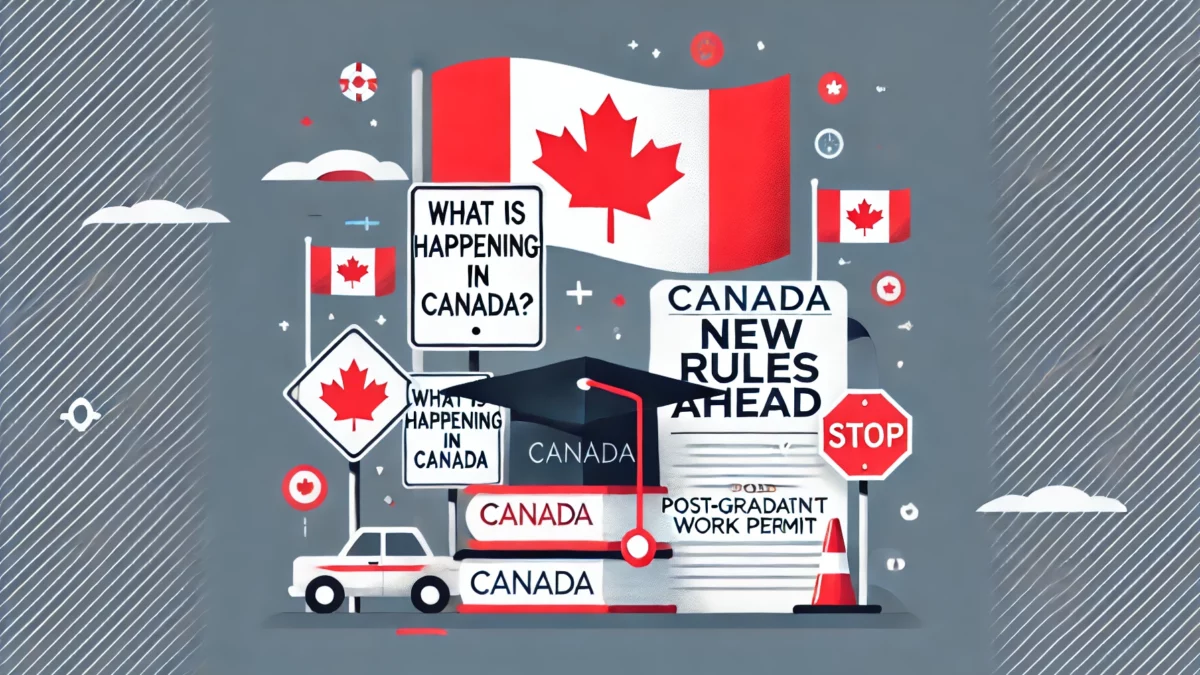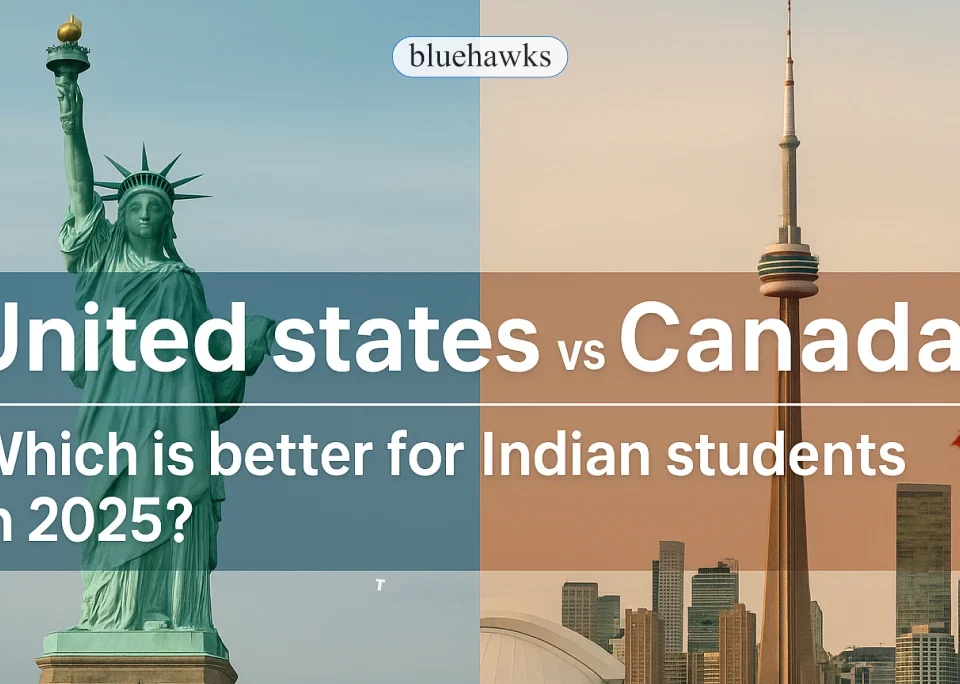What is happening in Canada? Major Changes to Canada’s PGWP Requirements

What is happening in Canada? Major Changes to Canada’s PGWP Requirements
Estimated reading time: 5 minutes
On October 4, 2024, a routine day turned into one of shock for international students across the globe. IRCC (Immigration, Refugees and Citizenship Canada) announced new changes to the Post-Graduation Work Permit (PGWP) rules. Thousands of students now found themselves wondering, What is happening in Canada?
Imagine you’re a student planning to study and work in Canada. You’ve picked a program, secured a student visa, and are preparing to build a future there. Suddenly, these new regulations emerge, and your plans might not work as you expected.
Table of contents
- What is happening in Canada? Major Changes to Canada’s PGWP Requirements
- The First Big Change: Language Requirements
- The Second Shock: PGWP Eligibility Limited to Specific Fields
- Bachelor’s, Master’s, and Ph.D. Students Are Exempt
- What About Students Already in Canada?
- A Major Concern for Incoming Students
- Checking Program Eligibility: A New Essential Step
- Tips for Navigating Canada’s New Rules
- Moving Forward
- How bluehawks Stands Out in Helping Students Realize Their Canadian Dreams
The First Big Change: Language Requirements
From November 1, 2024, PGWP applicants must now meet a language proficiency requirement, which previously applied only to study visas and permanent residency. For college programs, the minimum requirement is a Canadian Language Benchmark (CLB) 5, while university students need to achieve a CLB 7. Accepted language tests include IELTS, CELPIP, and PTE for English, and TCF and TEF for French. This change has led many students to question again: What is happening in Canada?
Imagine being a student who didn’t plan for these new language rules. Now, meeting this requirement may feel overwhelming. But unfortunately, there’s more to the story.
The Second Shock: PGWP Eligibility Limited to Specific Fields
IRCC has also limited PGWP eligibility to specific fields. Only students studying healthcare, transportation, trades, STEM (Science, Technology, Engineering, and Math), and agriculture will qualify if they apply for a study permit on or after November 1, 2024. Students in fields like business and hospitality may lose their chance at a PGWP once they graduate.
This limitation has left many in creative or business-focused fields feeling anxious. Imagine studying international business, excited to start in Canada, only to learn you may not get a work permit after completing your studies. With these restrictions, students are asking: What is really happening in Canada?
Bachelor’s, Master’s, and Ph.D. Students Are Exempt
Not all students need to worry about the new restrictions. Those pursuing a Bachelor’s, Master’s, or Ph.D. program are exempt from the field-based PGWP eligibility requirement. They can apply for a PGWP, regardless of their field of study. However, diploma or certificate students outside the approved fields are still affected.
What About Students Already in Canada?
Students already studying in Canada don’t need to worry about these restrictions—if they apply for their PGWP before November 1, 2024. They’re safe from the new field restrictions and language requirements. However, students applying for their PGWP after that date must meet the language requirements, though the field restrictions won’t apply.
A Major Concern for Incoming Students
For students still planning to study in Canada, these changes are a challenge. Those with acceptance letters and paid tuition but no study permits now face tough decisions. If they apply after November 1, their program must fit one of the five approved fields to qualify for a PGWP.
Imagine a student accepted into a Canadian business program who is about to apply for a study visa. Suddenly, they realize their program won’t meet the new field restrictions. Faced with this setback, they’re asking, What should I do with these drastic changes in Canada?
Checking Program Eligibility: A New Essential Step
Students now need to verify if their program qualifies for a PGWP. Fortunately, they can easily do this through the CIPD 2021 database on the Canadian government’s website.
Picture a student excitedly searching “Data Science” in the CIPD database. They feel relief upon finding it listed. But those in unapproved fields face uncertainty.
Tips for Navigating Canada’s New Rules
Despite these PGWP changes, students can still achieve their Canadian dream with careful planning. Here’s how:
- Select an Approved Field: Consider programs in healthcare, transportation, trades, STEM, or agriculture.
- Pursue a Degree Program: Bachelor’s, Master’s, and Ph.D. students remain eligible for a PGWP, regardless of their field.
- Prepare for Language Tests: Familiarize yourself with accepted language tests, like IELTS or TCF, and aim to meet the required CLB score.
- Stay Informed: Keep up with IRCC updates on policies and requirements.
Moving Forward
Canada’s immigration policies are evolving, with a focus on aligning work permits with the country’s workforce needs. These new rules, while challenging, also present opportunities for students who can adapt. For those studying in or planning to study in Canada, staying informed and flexible is key.
In a world where policies are constantly changing, what is happening in Canada today may shape your future. So stay curious, proactive, and ready to adapt—because in Canada, opportunities still await those who persevere.
How bluehawks Stands Out in Helping Students Realize Their Canadian Dreams
As Canada’s evolving landscape continues to attract students worldwide, it’s essential to have a guiding partner who truly understands your goals and unique needs. At bluehawks, we pride ourselves on going beyond traditional support, offering a personalized approach to help students successfully navigate the complexities of studying abroad. Our expertise spans from selecting the right programs and institutions to meticulous assistance with visa applications, adapting to Canada’s culture, and ongoing mentorship for a smooth transition.
Whether you’re drawn to Canada for its academic opportunities, diverse culture, or the promise of a brighter future, bluehawks is dedicated to making your dream a reality with professional, tailored, and comprehensive guidance every step of the way.
Ready to take the first step? Discover how bluehawks can help turn your Canadian dream into a fulfilling journey!



